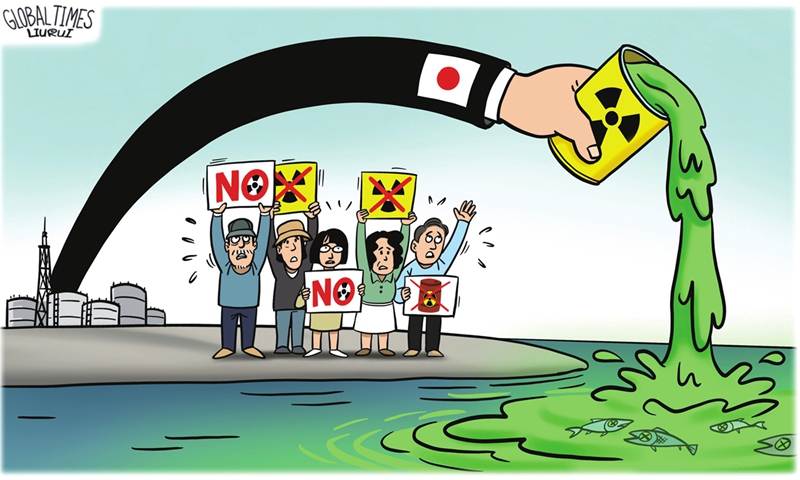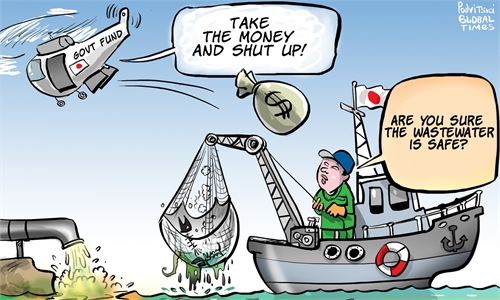Japan should face up to legitimate concerns at home and abroad, revoke erroneous plan to dump nuclear-contaminated wastewater into sea: Chinese Ambassador

Japan's dangerous move.Illustration:Liu Rui/GT
Japan's plan to dump nuclear-contaminated wastewater from Fukushima into the Pacific Ocean affects public health in every country, the global marine environment and the international public interest. Japan should face up to legitimate and reasonable concerns at home and abroad and revoke its erroneous decision to the dumping plan, Chinese Ambassador to Japan Wu Jianghao said at a press conference on Tuesday.
The press conference was held by the Chinese Embassy in Japan to expound China's stance toward Japan's unilateral push to dump nuclear-contaminated wastewater into the sea. Also, on Tuesday, the Director General of the International Atomic Energy Agency (IAEA) Rafael Mariano Grossi is scheduled to kick off a four-day trip to Japan and visit the Fukushima Daiichi nuclear power plant.
Recently, a growing number of countries and experts have been voicing concerns over Japan's plan to dump nuclear-contaminated water from Tokyo Electric Power Co's Fukushima plant into the ocean.
More than 80 percent of respondents in 11 countries in the Asia-Pacific region except Japan said Japan's plan to dump nuclear-contaminated water into the sea is "irresponsible" and nearly 90 percent of respondents expressed negative sentiment including worries and shock toward the plan, 94 percent of them deemed the move will have a negative effect not only on Japan and Pacific Rim countries but also the whole world, according to a survey conducted by the Global Times Research Center .
Japan's plan to dump the nuclear-contaminated water into the sea lacks legitimacy. The Chinese ambassador said that the Japanese side did not conduct sufficient consultation with neighboring countries and other stakeholders, and unilaterally made a decision to discharge the contaminated water. In fact, the plan imposed by the Japanese government is neither the only option nor the safest and most optimal disposal solution.
The dumping plan will pose enormous risks to the global marine environment and human health as the Fukushima nuclear-contaminated wastewater is in direct contact with the melted reactor core in the Fukushima nuclear accident and contains more than 60 types of radioactive nuclides, Wu said, noting that no effective purification technology exists currently to treat the water, and that some radioactive nuclides and long-lived nuclides may diffuse with ocean currents and increase the total amount of radionuclides in the environment.
The Fukushima nuclear accident has produced more than 1.3 million tons of nuclear-contaminated water so far. There is no precedent for treating such a large amount of nuclear-contaminated water with such a complex composition. The dumping plan will last for 30 years or even longer, and a large amount of nuclear-contaminated water will be produced in the future. The effectiveness of the Advanced Liquid Processing System (ALPS) technology that Japan will apply has not been evaluated or certified by a third party, leaving huge doubts about the long-term reliability of the purification device, said Wu.
Wu also noted that the Japanese government's forcibly pushing out dumping plan violates its obligations under international law. Japan's discharge of nuclear-contaminated water into the sea through the undersea tunnel violated the provisions of the 1972 London Convention on the Prevention of Marine Pollution by Dumping of Wastes and Other Matter that prohibits the dumping of radioactive waste into the sea through artificial structures at sea. As a responsible member of the international community, Japan should earnestly fulfill the above-mentioned international obligations, not the other way around.
The IAEA assessment report cannot be a "rubber stamp" for Japan's discharge plan, the Chinese ambassador said, noting that in terms of mandate, the IAEA is an international agency that promotes the safe, secure, and peaceful use of nuclear technology, and is not an appropriate agency to assess the long-term impact of nuclear-contaminated water on the marine environment and biological health.
Moreover, the Japanese side has restricted the work of the IAEA group and has not accepted its evaluation of other disposal options. Based on the above, the IAEA's report cannot prove the legitimacy of Japan's sea dumping plan, nor can it exempt Japan from its moral responsibilities and international legal obligations.
Wu also urged the IAEA to uphold the principles of objectivity, impartiality and professionalism, fully respect and adopt the opinions of experts from all sides of the working group and the final report to be released should stand the test of science and history.
At the Tuesday press conference, Wu also said that Japan lacked sincerity in holding dialogue and consultations with China.
The Japanese side's so-called "hope" for dialogue and consultation with the Chinese side lacks sincerity. China has repeatedly expressed its concerns over the dumping plan through bilateral and multilateral channels but Japan has ignored China's stance and insisted on pushing forward the plan in accordance to its timetable.
Given Japan's attitude, "what is the meaning of having consultations?" asked Wu, noting if the Japanese side is sincere in the negotiation, it should suspend the sea dumping plan, agree to discuss all possible disposal options, allow stakeholders to conduct independent sampling and analysis, and effectively address the concerns of all parties.
Global Times

